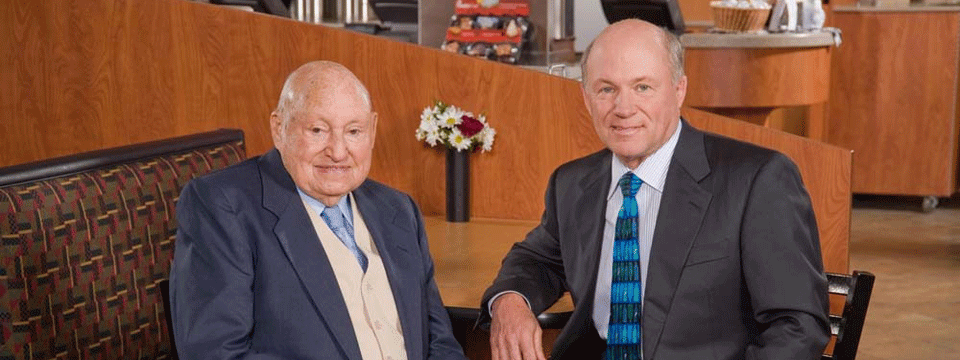
by Phillip Larsen | Sep 9, 2014
It never fails. I leave church on Sunday, I am hungry, and I am craving a chicken sandwich. I drive up the turnpike and there it is…almost taunting me: “Chick-Fil-A (Closed Sundays)”. Why is it that my cravings for chicken sandwiches are unnaturally higher on Sundays than any other day of the week? I guess it is the concept of wanting what I can’t have. Or it may be that I am a crazy person, but let us reserve judgment until all the facts are in.
S. Truett Cathy is the founder of the Chick-Fil-A restaurant chain. Cathy is also celebrated as a man of faith, to which his decision to keep Chick-Fil-A closed on Sundays is a testament to. Cathy was by reports a wonderful man, a savvy businessman, concerned about family dynamics, and worked as if he was working for the Lord. Cathy stood on principle, even when principle was costly.
Having worked in the restaurant industry before, I have come to realize how incredible the decision for Cathy to close on Sundays was. In research for a ministry, I did some research on the restaurant industry. I knew some of the trends of the restaurant industry simply through experience but wanted to get some numbers to support my assumptions. I researched the busiest shifts for the restaurant industry in the Oklahoma City area and I found that the Sunday Lunch shift is the 3rd busiest shift of the week behind Friday and Saturday night. Take into consideration that Chick-Fil-A is more of a lunch kind of restaurant and we can safely assume that for Chick-Fil-A, if they were open on Sunday, they would be busy. The decision to not be open on Sundays for the “after church crowd” is just as much a financial decision as it is a principled one. By not being open on Sundays, Chick-Fil-A is leaving money on the table.
Standing on principle is easy, as long as it doesn’t cost you anything. Being principled is easy without sacrifice. It is when God calls us to be faithful in the face of loss that we truly understand what the true definition of “faith” is. How many meetings did Cathy have with how many people who tried to convince him to abandon his Sunday policy? “The free market is speaking” they must have said as they revealed data saying that Sunday chicken would positively affect the bottom line. In a time where the pursuit of the almighty dollar seems to be reaching levels of idolatry and where public confidence in both business and government is at all-time lows, it is refreshing to see that this organization holds fidelity to Jesus and not the balance sheet. Considering that Chick-Fil-A is privately held and family run, I anticipate this principled stand to endure.
Rest well Mr. Cathy. Thank you for your example of faithfulness.

by Phillip Larsen | Jul 31, 2014
Apologetics is important. Apologetics codify what we believe in. They allow for us to answer the question “Why.” The answer to the question “Why” is where apologetics lie.
Answering “Why” allows us to have our beliefs engrain themselves into our being. If we can answer the question “why do I believe what I believe?”, then I am able to defend those beliefs against doubt, disbelief, and even attack from the enemy.
Apologetics do not lie within the “what we believe” because if we answer “what” without knowing the “why”, then what we believe is an arbitrary set of facts that have no application in our lives. Like in our middle school algebra, showing our work on how we got to the right answer is just as important as the answer itself. Knowing how to get the answer is just as important as the answer itself.
That is why I love apologetics so much. Scripture has modern application to our lives, and failing both to recognize that and to teach that is detrimental to our individual walk with Christ and the corporate gathering of believers each and every Sunday. Teaching people to strive for the reason behind their beliefs as much as the target of their belief has created and will create a foundation for vast spiritual growth that will sustain the turbulence of indecision and doubt that has written about time and again as the millennial generation has come of age.
An example of the practicality of Scripture is demonstrated in a study of general economic principles that was written about on the three things that, if done, usually result in economic stability. The part of the story that does not get written about is that the three principles discussed are scriptural in their nature.
The first general principle is to graduate from high school. A high school diploma is incredibly important when it comes to finding a job that not only pays well on the outset but also has a career track that will result in a greater income in the long run. The lack of a high school diploma typically means that the individual will be stuck in the lowest quadrant of the socio-economic division. This is further demonstrated by the fact that most studies show that a college diploma is typically worth $1 million more than a high school diploma in the course of an individual’s working life.
What we sometimes forget is that God wants us to thirst for knowledge and wisdom. The natural and developed intelligence of Jesus during the incarnation is something that we can hardly fathom. Dallas Willard puts it best in his most acclaimed worked The Divine Conspiracy.
“He is not just nice, he is brilliant. He is the smartest man who ever lived. He is now supervising the entire course of world history (Revelation 1:5) while simultaneously preparing the rest of the universe for our future role in it (John 14:2). He always has the best information on everything and certainly also on the things that matter most in human life.”
If we are to believe that our calling as Christians is to model ourselves after Christ, then that example includes the fact that Jesus wants us to develop ourselves intellectually and to increase our cognitive abilities to the absolute best that they can be. We take our initial step of faith blindly, but that doesn’t mean that our entire faith journey is done so with our eyes closed.
The second general principle is to not quit a job until you have another one lined up. This seems like a no-brainer, but as our society produces less loyalty on both sides of the employer/employee relationship, it is sometimes too easy to make a snap decision and decide to leave a job that you don’t enjoy. According to LinkedIn (Social Media site dedicated to professionals), 85% of the American workforce will be active in their search for a new job. That means that if you are to decide to jettison your daily grind of your less-than-satisfying-paycheck-acquiring mechanism, then not only are you competing for the new job with the unemployed, but also the vast majority of the current working population as well. With these kind of odds, leaving your two-week notice without a plan is to have the simple numerical odds work against you.
Quality of work and work ethic are topics that do not escape the scope of scripture. God desires us to work and to work with excellence. God desires our very best as if we were under His direct supervision rather than that of our current boss (Col. 3:23, Eph. 6:7). Our natural working position is to offer our very best. How we work is to be an offering to God, and God deserves the very best that we have to offer. Looking for a new job is not necessarily a bad thing, but during the search, Scripture demands that we find a place where we can strive for excellence and serve others in a way that makes it obvious that Christ is the most important thing in our lives.
The final general principle for economic stability is to avoid having children before marriage. Out of all the general principles, this may be the most controversial, because of the overt sexual nature of our society. The subject of sex and the church is one that always evokes controversy, because we have abdicated this subject because of its…well…touchy nature. Because of this, the by-product is that the truths of scripture have been lost as society formulates its own relative morality when it comes to sex.
Much has been written about the income disparity of the average family and how the wages of the middle class have stagnated since the early 90’s. An article in the Wall Street Journal details that the median income of a married family is roughly three times that of a single parent household. Furthermore, the statistics show that the number of single parent households has risen steadily in the same time frame. Thus, the rising of single parent households, and the fact that single parent households earning power is exponentially diminished comparatively, the economic statistics bear this out.
It is no secret that even in the church’s sporadic sex education, which they advocate for abstinence before marriage. Matthew 19:5 details the model in which God intended for a young person to leave their father and mother and start a family of their own. When that happens, husband and wife become “one flesh”. In this instance the lack of apologetics shines through as those who claim to follow Christ and also admit to having sex before marriage has risen to close to 80% according to recent surveys. The truth of the matter is that abstinence education is not a dusty puritanical suggestion of days gone by, but rather practical advice to avoid the economic albatross of single parenthood. It turns out, that God provides us with these structures within scripture for no other reason than for our benefit. When we engage in these behaviors and the effect is our destruction, this is nothing more than an example of causation and nothing more.
Connecting what we are teaching in Scripture to the practicalities of the everyday lives of the people around us. We must do that for no other reason than we love them and care about their well-being. Without practical application, there is no apologetic. Without love as the bedrock of our teaching, we are just cymbals and gongs.

by Phillip Larsen | Mar 3, 2014
This past weekend I was fortunate to lead a breakout session for Focus Weekend 2014 in Tulsa. One of my favorite things to do is to stand in front of a group of people and talk about Jesus. It is something that I feel like I am pretty good at and is something that I take very seriously. I’ve always subscribed to the philosophy that if you are given the opportunity to share with a group of people, then that is an opportunity to connect people to the gospel. Anything else is a complete and utter waste of time. It is because of this that I view these times as a sacred opportunity to be taken full advantage of.
Although the breakout sessions were a lot of fun, what I will remember from this week is a conversation that I had with an individual in between a couple of the breakouts. This gentlemen was around my age and had served our country in the armed forces. He had told me that he recognized my name through some of my published writings. One in particular though is worth mentioning and the center of our conversation.
Almost three years ago, I wrote an article that was published by the Baptist Messenger expressing some of my thoughts about the military action and subsequent response to Osama Bin Laden being killed. It is a memorable article for me because it was the first piece that I wrote in which its reach was far beyond my normal readership both on my personal blog and through the posted article on the Messenger. Furthermore, it is a piece that I was especially proud of and had a number of people reach out to me and say that I did an outstanding job.
This gentlemen recognized my name and made the connection that I was the author of this piece. After a one of the breakouts, he pulled me aside and told me that the article that I had written almost three years ago had touched his life in a profound way. God moved in his life through this article to address issues with bitterness and forgiveness. To say that I was amazed would be an understatement. I started to get goose bumps as he continued with his story and on how this article impacted his life.
God uses us in ways that are simply beyond our vision and beyond our comprehension. For me, what I wrote three years ago and had picked up by the Baptist Messenger touched this guy’s life, and I had no idea who he was. Because I was faithful to God’s prompting, He was faithful to bless that. As a writer and someone who travels and speaks, I don’t always get to see the fruits of my labor. The truth though is that witnessing the net effect of God’s movement is not a prerequisite for my faithfulness to His prompting. He moves and utilizes me in a way that results in His glory and not for my own.
The challenge for both me and for everyone is to be content in the fact that He will use our talents as He sees fit and for His glory, and that the impact that we have on people’s lives is sometimes beyond our own vision.

by Phillip Larsen | Jan 24, 2014
Hope is Alive…indeed.
Oklahoma City has a new dealer and the product is Hope. Lance Lang delivers a powerful message about hope in his book: Hope is Alive: One Addict’s Story of Hope.
Lang is a son of a pastor who was part of a successful business. But he is more than that; he is a drug addict. His book talks about the facade that he had built, the hope that had departed, the dark journey that he undertook, and the eventual rock bottom that many people with substance abuse experience.
Lang’s hope meter had flat lined. Rock bottom had come at terminal velocity and, as he describes it, almost killed him. But like a defibrillator shocking a heart back into rhythm, God’s mercy shocked His hope back into Lang’s life. “Hope is Alive” details how days of despair and uncertainty yielded to days of expectation, freedom, joy, and most importantly, hope.
Hope is Alive does a wonderful job detailing Lang’s personal journey through addiction and recovery. Lang takes the lessons learned from his own personal story of recovery and gives practical strategies on how to experience success in their own life. Although written from the perspective of someone who experienced a substance addiction, the principles of Hope is Alive are applicable to all addictions. Lang makes it abundantly clear that recovery is a team sport and that recovery is intentional.
Lang talks about “Hope Partners” being people in his life that have an all-access pass to his life to make sure that he stays faithful to his recovery. This lines up with the concept that God desire community both with Him and with each other.
Lang makes the most important concept plain throughout the work in talking about how recovery does not come by accident. Recovery from addiction is intentional and a choice that someone has to make everyday. Recovery from addiction requires substituting the negative influences, settings, and situations with positive ones. Throughout Lang’s work, he offers practical and spiritual applications in an effort to give those in recovery the best possible chance for success.
The truth of the matter is that there is a hurt, habit, or hang-up that we all struggle with. A result of the fact that we are sinful people is that we engage in habitual sin. Hope is Alive is a resource to help tap into the restorative power of hope that God provides. Hope is Alive is not just for those recovering from substance abuse. It is for everyone who needs to realize that the God of the universe is offering the most powerful resource that the world has ever known. The power of Hope.

by Phillip Larsen | Jan 10, 2014
Like many people, I am an indirect consumer of public education. My two wonderful girls go to an Edmond school, and for the most part, we are very pleased.
Before we continue, this is not meant to be a debate about public/private/home school. That is too hot of a topic to be discussed in my third post for Word Slingers. There is still a chance that some people may like me, and I would like to keep it that way.
One thing that I believe is education is important, and putting a priority on education is important. I have a selfless desire to see education progress because a reliable measure of a society’s success is proportional to a society’s level of education.
I also have a selfish desire to see education progress because, as a writer, I would like a population that is educated to the point where they can read and understand what they are reading, so they can read and understand the books that I currently have out and future works.
As one who is a big fan of critical thought, I join many people in concern about public education’s penchant for measuring success and failure through standardized tests. Like many, I have a fear that my kids will learn how to be test takers and not critical thinkers.
Nobody has looked back at a test and thought “Wow! That was inspirational!” The world has not been altered by a small, thoughtful, and committed group of test takers.
For general education, we are all in agreement that learning how to think is just as important as what to think. The concept of critical thinking though does not always translate to Christian education.
Don’t get me wrong, the concept of absolute truth is important, and I am not saying that Christian education progress into the world of relativism, because that would be heresy. What I am saying is that when the vast majority of people will admit when surveyed that they do not have a clue how the Bible applies to their everyday lives, that shows that we can do better in teaching critical thinking within our churches. Teaching scripture without application is a wasted opportunity because there is not avenue for life change, and as a church, we have to be constantly in the business of changing lives.
The truth of the matter is that, like all things, we will only reap the rewards of a faith that we invest in. That requires a relationship with Christ that is an everyday experience and not a weekly ritual. Outsourcing our spiritual development to a pastor, youth ministers, Sunday school teacher or podcast does an incredible disservice to our own spiritual progression.
As learners, our obligation is to take responsibility for our own spiritual development. The simple dynamic of a relationship with Christ would demand that it is something that is a personal experience and not one that can be supplanted by anyone else.
Our relationship with Christ demands that we dive deeper than the memorized recitation of facts as if we are preparing for a celestial final exam that doesn’t exist. Our relationship with Christ demands that we allow Christ to make us uncomfortable in our own lives to the point that he is turning over the tables of our own self creation that get in the way of allowing us to fully realize the width, depth, and breadth of His love for us as well as the designs He has for us life and its relative benefit. Stretching ourselves on an intellectual level when it comes to Christian education is paramount to that end.




